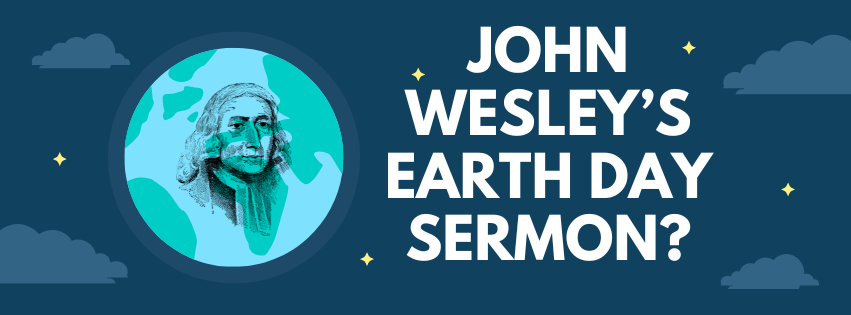Back in May of 1768, John Wesley gave a sermon titled, ‘The Good Steward.’ In this sermon he focuses on the text from Luke: “Give an account of thy stewardship; for thou mayest be no longer steward. (16:2).” In this sermon, Wesley has four main points:
I. In what respects are we now God’s stewards?
II. When he requires our souls of us, we “can be no longer stewards.”
III. We will need to “give an account of our stewardship.”
IV. There is no employment of our time, no action or conversation, that is purely indifferent and we can never do more than our duty.
One can read the 1872 version of this sermon in its old English here. Wesley talks a great deal about money as one example of stewardship, which is appropriate given the Luke text from which he is preaching. But as I read this 250-year-old sermon once again, I couldn’t help but see how much Wesley was advocating for the care of the earth.
When I took Wesley in seminary we had to outline fifty of his sermons, restate several in modern English and even preach one for a modern day audience! This taught us about Wesleyan theology, preaching and history all at the same time. So I thought, ‘let me take what I am reading about stewardship and care for creation in Wesley’s sermon, apply those seminary skills, and restate Wesley’s points about being stewards of the earth in today’s context in updated English’. Perhaps this is what Wesley might preach on Earth Day?
Let us consider the Earth, the precious gift entrusted to us by the Divine. We are not mere spectators but stewards, tasked with the care of this magnificent creation. Just as a steward manages the affairs of a household, so are we called to manage the resources of the Earth.
Think not that this responsibility is reserved for a select few; it is incumbent upon all of us, irrespective of our station in life. The Earth does not belong to any single individual or generation; it is a shared inheritance, passed down to us from those who came before and to be preserved for those who will come after.
As stewards, we must cherish and protect the Earth, for it sustains us and provides for our needs. Let us not be wasteful or reckless in our use of its resources but instead be mindful of the impact of our actions on the planet.
Consider the interconnectedness of all life on Earth—the delicate balance of ecosystems, the beauty of biodiversity. Each creature, each plant, plays a vital role in the intricate web of life. Let us honor and respect this diversity, for it is a testament to the Creator’s wisdom and love.
Yet, let us also recognize the grave threats facing our planet today. Climate change, pollution, deforestation—these are but a few of the challenges we must confront. The health of the planet is inextricably linked to our own well-being; what harms the Earth, ultimately harms us.
Therefore, let us act with urgency and determination to safeguard the Earth for future generations. Let us embrace sustainable practices, reduce our carbon footprint, and advocate for policies that protect the environment.
But our stewardship extends beyond mere conservation; it encompasses a reverence for all life and a commitment to justice. Let us stand in solidarity with those most affected by environmental degradation, recognizing that the poor and marginalized often bear the heaviest burden.
In all that we do, let us be guided by love and compassion, for the Earth is a sacred trust, and we are called to be faithful stewards. May we honor this responsibility, not out of fear or obligation, but out of gratitude for the gift of life and the wonder of creation.
My friends, let us be good stewards of the Earth, caring for it with diligence and devotion. For in doing so, we honor the Creator and fulfill our purpose as custodians of this precious planet.
This Sunday as we celebrate care for creation, our Creation Care Team has a wonderful Expo planned for our Fellowship Time and I’ll be preaching on Stewardship both broadly and as it pertains to the theme of ‘Planet vs. Plastics.’ My hope is that through this post and preaching and all our efforts, we see care for creation not as a ‘good thing to be done’ or a form of virtue signaling, but as a divine call to be good stewards of all that God gives us: people, planet, relationships, time, and money, so that we might be able to give a favorable account of our stewardship.
Moving on toward perfection,


